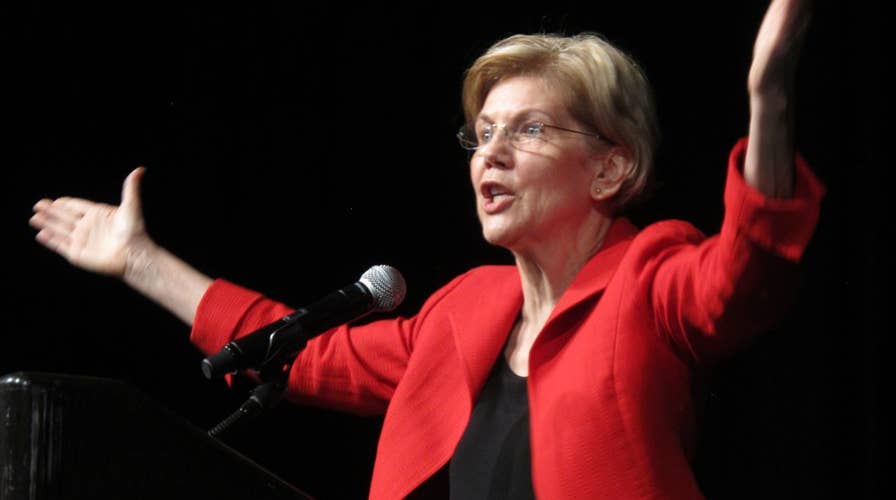Warren proposes plan to tax wealthy up to 100 percent
Dan Bongino wraps up a wild week in news with News Explosion on 'Tucker Carlson Tonight.'
While South Bend, Ind. Mayor Pete Buttigieg is enjoying a surge in the polls in Iowa, Massachusetts Sen. Elizabeth Warren has consistently shown staying power nationally to remain the frontrunner for the Democratic nomination. However, before she declares victory and announces its time to focus on the general election, here is an obvious question for her. If she is so convinced that a national popular vote is how we should elect the president of the United States in the general election, why don't Democrats hold a national primary to select their presidential nominee?
At the core of Warren’s plans for America is the end of the Electoral College. She wants to replace it with a national popular vote.
She is hardly alone among Democrats. Day after day, we are treated to Democrats decrying the Electoral College as being unfair, as being wrong, as being something that gives too much-undeserved power to voters in less populated states.
However, when one examines the arcane and near-mystical process the Democrats have chosen to determine their nominee for president of the United States, one would be hard-pressed to conclude anything other than that Democrats are unwilling to put their money where their mouths are.
It would seem to be a pretty simple matter to switch to a national primary where whoever receives the most votes is declared the winner. Why don’t Democrats do that?
More from Opinion
One concern could be that with multiple candidates vying for the party’s nomination, one of them could prevail with less than a majority of the votes. That is surely so. Would not that same logic apply to anytime there was a strong third-party candidate?
We did not hear Democrats in 1992, 2000 or any other time arguing that only the votes of the two major-party candidates should count in the presidential tally to ensure the winner has earned a majority of the votes.
In 2016, when Hillary Clinton prevailed over Sen. Bernie Sanders, I-Vt., it is pretty clear the Democratic National Committee (DNC) put more than a thumb on the scale to all but assure that she prevailed.
If you go back to the last truly contested race for the Democratic Party nomination, in 2008, the process used might startle you. Suffice it to say, it was a little different than one man, one vote.
Florida and Michigan did not hold their primaries on the days the DNC deemed proper, so their votes were treated in a different fashion than those cast by voters in states bowing to the DNC. They did not even count the popular vote from Michigan (where President Obama did not have his name on the ballot). Eventually, the decision was made to split the delegate vote evenly in these two states, despite Clinton having defeated Obama soundly in Florida where both names were on the ballot.
It gets weirder. Democrats abroad, including those in American Samoa, Guam and the Virgin Islands had delegates who each received a half vote. Would it not just have been easier to have them cut the number of delegates in half?
At the end of the day, if you include the votes cast in Michigan, Hillary Clinton received 48.1 percent and Barack Obama 47.4 percent. Really close.
When delegates selected via primary and caucus were totaled up, neither candidate had enough to win at the convention.
So, just how did the Democrats resolve this tricky and difficult situation? Why, they turned to their consiglieres, otherwise known as super delegates. These are elected officials, party officials, etc.
CLICK HERE TO SIGN UP FOR OUR OPINION NEWSLETTER
In other words, an elitist class established to fix problems when the electorate gets out of hand. The super delegates overwhelmingly sided with Obama, and he became the nominee.
Fast forward to 2020. The Democrats are still holding a series of primaries, conventions, and caucuses. Fully 16 percent of the delegates will do nothing more than wake up in the morning and be designated as such. No longer are they called “super delegates.” These folks are now “automatic delegates,” as though they are granted divine intervention powers.
In other words, it’s more of the same old, same old. You do not even hear a murmur that this process should be replaced by a national primary.
CLICK HERE TO GET THE FOX NEWS APP
The conclusion here is pretty simple. If the Democrats think a straight-up election with a winner-take-all outcome in the general election for president is right and good enough for the nation, they ought to at least demonstrate the pretense of the courage of their convictions and apply that standard to themselves.
Until that day comes to pass, Americans will have to accept that their posturing on the Electoral College is just that… posturing.









































